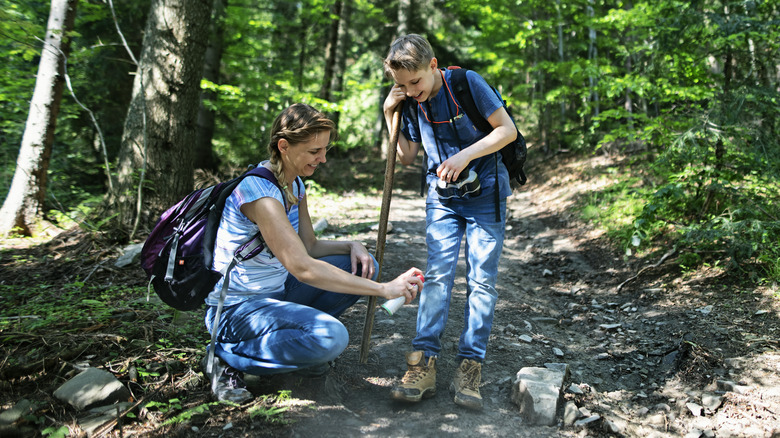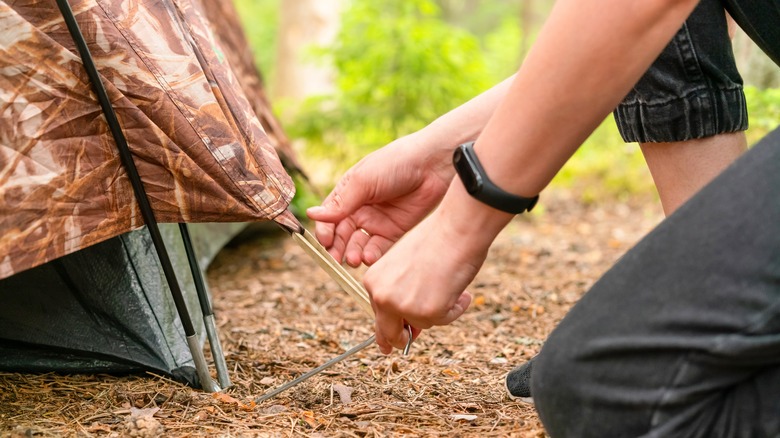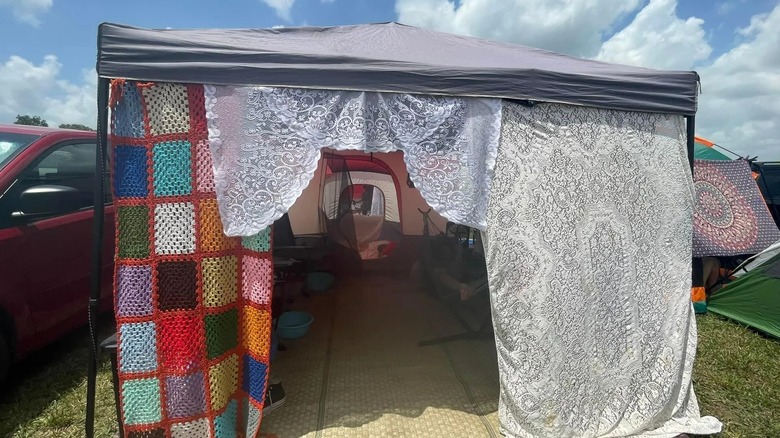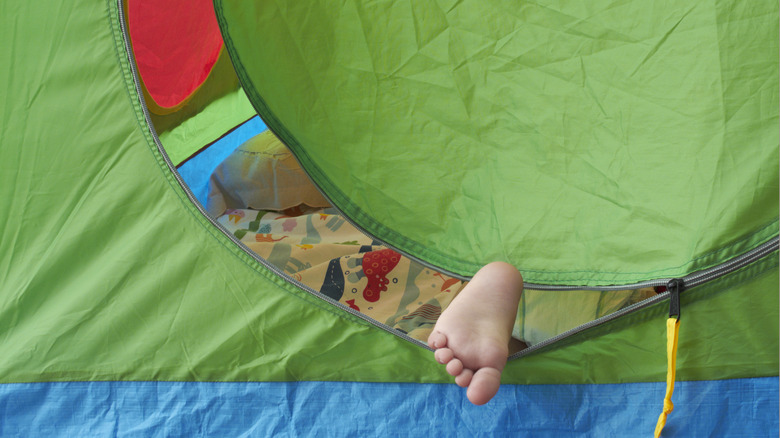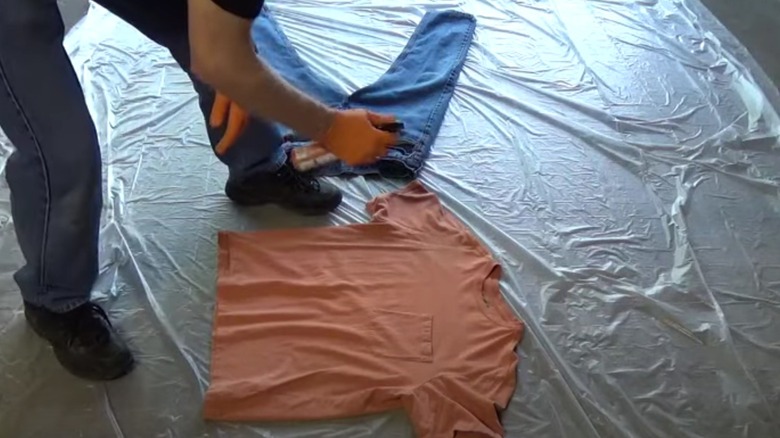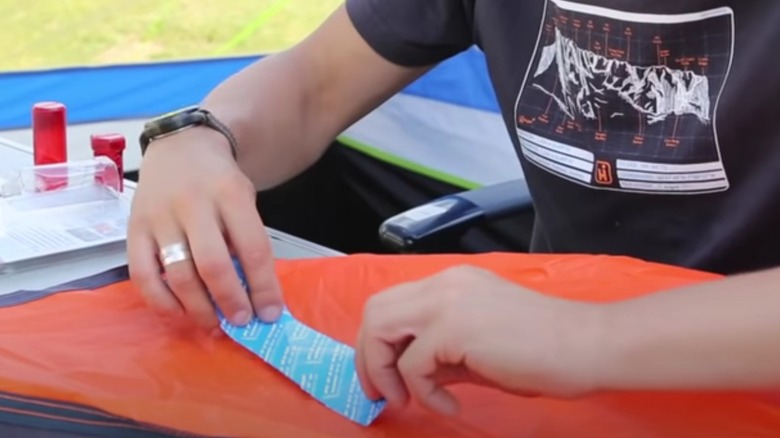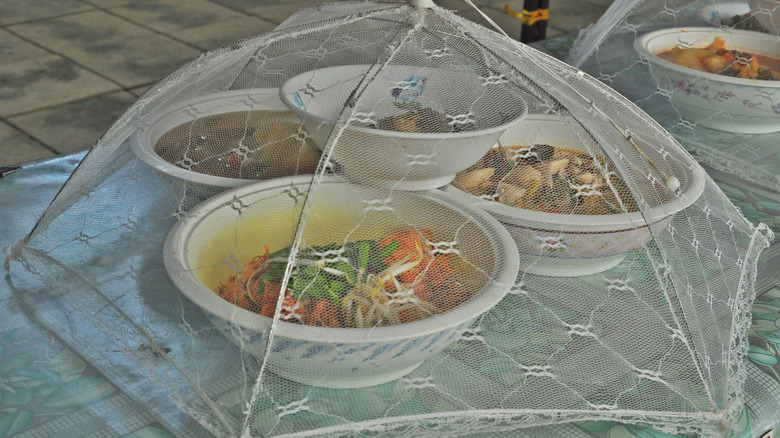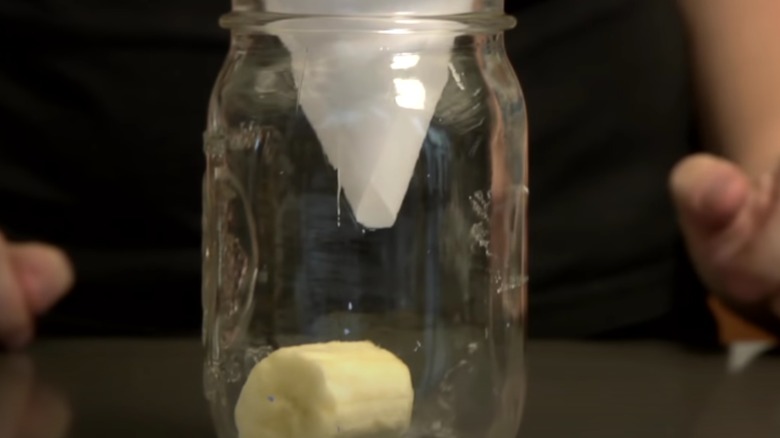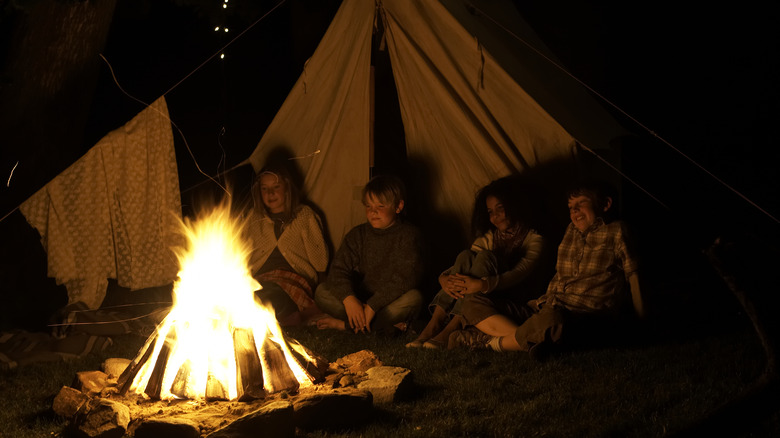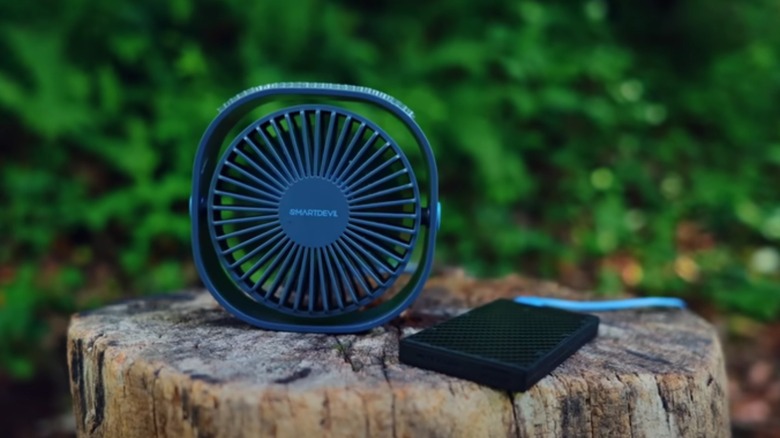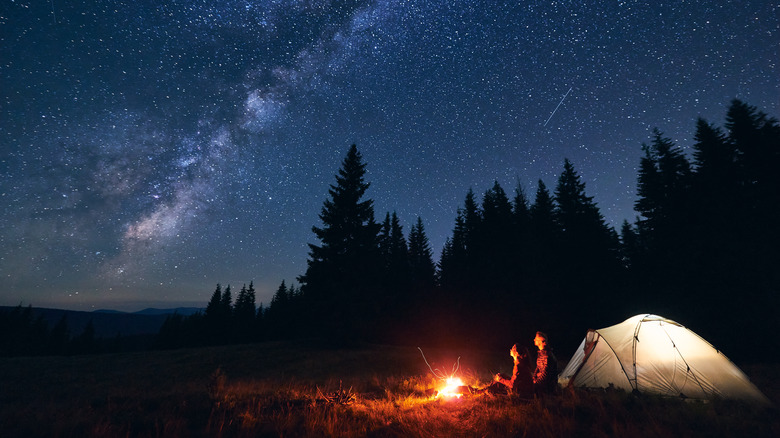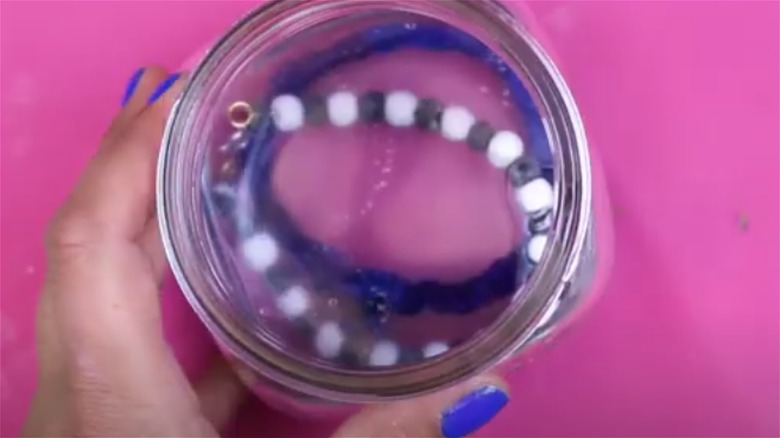13 Genius Hacks That Will Keep Bugs Away While Camping
For those of us who love camping, there's nothing like waking up in the great outdoors or going to sleep under the same starry sky that Van Gogh was so enamored with — except, of course, the pure bliss of waking up to sunrise in the Rocky Mountains or overlooking the beach. But when your perfect getaway means having to constantly swat away mosquitoes or deal with the misery of itchy welts all over your skin, you can start to wonder if a continental breakfast doesn't sound all that bad after all. And it sure beats flies and ants crawling all over your pancakes.
But before you trade your bluebird morning for a roadside motel, we've got a better solution — a few, actually. With a little planning and a few handy camping hacks, you can banish those buggy menaces and set your mind on more important things like what to put on your gourmet s'mores (the answer is always cookie butter). Put down the hotel app and back away slowly as we break down 13 bug-banishing hacks you'll be buzzing about.
Choose where to set up camp carefully
One of the best ways to tell novice campers from seasoned ones is how they set up camp. Often, someone new to camping will look for the first flat, open space and plop their tent down without putting a lot of thought into it. A more experienced camper, on the other hand, will take some time to scope out the site and ensure they're setting up camp in the optimal location.
There's nothing quite like the sound of a babbling brook or a soothing beach nearby to lull you to sleep under the starry summer sky, but what you don't want under any circumstances is to pitch a tent near standing water. Part of the lifecycle for many mosquito species involves laying eggs on the surface of water, making standing water naturally attractive to the pesky creatures. In other words, pitch your tent next to a puddle or small pond, and you'll likely have some uninvited — and hungry — dinner guests. Worse, some of those guests could come with a party gift like the West Nile virus.
Before setting up camp, look around the campsite for any sign of standing water. Once you've settled in, be vigilant about leaving buckets of water around. While settling on a campsite, it's also a good idea to eyeball the area for any sign of anthills or wasp nests. And whatever you do, don't pitch your tent next to the waste disposal bins.
Use a mosquito net or entry room
Most tents have mesh windows so you can experience the cool breeze without letting a bunch of flies in. But depending on where you're camping, bugs often seem to find their way in anyway, slipping in surreptitiously as campers zip and unzip the tent door. And few things will ruin a night under the stars like a few hungry skeeters or biting flies in your tent. The good news is that there's an easy solution to this problem: a second layer of mesh.
Mosquito nets are the easiest, most affordable way to get this. If possible, pitch your tent under a tree with a branch appropriate for hanging your mosquito net. That way, you've got a little extra space around your tent. Using a rope, adjust your mosquito net to a height that allows you to tuck its ends underneath the tent.
Another option is to create an exterior barrier room adjacent to your tent by setting your tent up next to a canopy, covering the walls with mosquito netting, or some other barrier like blankets or sheets. You might not keep everything out, but you're more likely to see fewer flies inside your tent simply by limiting their direct access to your tent door. As an added bonus, you'll get a lovely shaded seating area perfect for use as a common space.
Keep your tent door closed
It might seem obvious enough, but keeping your tent door closed at all times is one of the surest ways to keep bugs outside and far away from your sleeping bag. And while that seems like a no-brainer, things can quickly get chaotic around the campsite in the heat of a busy afternoon, and it's easy to start slacking. If you spend much time checking out camping videos on YouTube, you'll notice that leaving the tent door open is a common bad habit, even among folks who camp often. It's also a great way to end up with spiders, centipedes, or even snakes inside your tent.
Unless you love the idea of an eight-legged visitor, manage your tent door like a part-time job. Ensure everyone in your party understands the door needs to remain closed as much as possible, limiting how often you go in and out of the tent. Before going inside your tent, take a second to make sure nothing is clinging to the door that could sneak inside when the door opens. Closing your zipper at the top of the door rather than the bottom makes it easier to ensure nothing can crawl inside the gap. And whatever you do, don't lollygag — get in and out as quickly as possible.
Treat your tent and clothing with permethrin
Chrysanthemums are one of nature's marvels. A species of aster, these lovely flowers are used in traditional Chinese medicine, look fantastic in a bouquet, and contain a natural insecticide known as pyrethrum. The synthetic version of this compound is called permethrin and is commonly used to control mosquito populations by shutting down the bugs' nervous systems. Considered a broad-spectrum insecticide, permethrin is also effective for killing many other insect species like ticks, fleas, flies, and cockroaches and is used in things like flea collars and spot treatments for pets. Permethrin is considered safe when used appropriately and is the only insecticide approved by the EPA for use on factory-treated clothing. And unlike DEET, it won't melt the nylon of your tent and is less likely to irritate your skin.
Be sure to purchase a permethrin product rated for use on clothing and tents rather than the higher concentration version sold for use with livestock. Avoid spraying your tent's rainfly since it's waterproof and won't absorb the insecticide. UV light will break down the compound pretty quickly, so be sure to reapply any areas exposed to the sun as needed. To apply permethrin to your clothing and shoes — which is helpful against ticks — you can soak them or spray them with permethrin. If you're camping for an extended period, the insect repellent will last for several cycles before it needs to be reapplied.
Be vigilant about holes
Tents are great at keeping bugs out of your space — until they get a hole in them. All of that sun, wind, and rain your tent is protecting you from tends to take a toll on the tent fabric, and the longer you own one, the more likely you are to end up with a hole in your tent. Taking care to store your tent properly helps, but life happens, and sometimes you need to seal up a hole while you're mid-camping trip.
It's always a good idea to inspect your tent when packing it up after a trip, ensuring there are no holes to surprise you while you're gone. If you have time before your trip and plan to be camping for a while, looking over your tent to confirm everything is hunky-dory can be worth the time investment. But if you do end up with a ripped tent while camping, a little preparation can go a long way in keeping bugs outside. Every seasoned camper should know how to perform a proper tent repair, but sometimes, we just need to get the job done — that's where duct tape comes in. The ultimate on-the-go mosquito defense system, duct tape can be applied in mere seconds and works fairly effectively to hold down the fort until you can patch your tent more permanently.
Don't feed the bugs
You probably already know leaving food and trash while camping out will likely draw bugs. When it comes to keeping your campsite free of bug snacks, you can't be fastidious enough. But it's always a good idea to make sure you've got the right supplies to make that happen, and everyone is on board with your anti-bug strategy ahead of time.
Anytime you're serving food, keep it covered until the very moment it's time to eat. Investing in mesh food tents is one of the cheapest and easiest ways to keep bugs off your food. These handy screens usually come in sets of four and can fold up and pop out to make packing easier. Once you've finished your meal, clean up immediately, using bleach wipes to get anything microscopic you might have missed. That includes rinsing or washing your dishes. Above all, you never want to leave food lying around for long. Bring storage tubs to secure things like open bags of chips and cereal, and keep everything sealed away neatly when you're not using it. Finally, don't leave trash bags around your campsite — they're sure to draw bugs, not to mention hungry mammals you probably don't want to stop by.
Make your own jar traps
If you find yourself particularly plagued with campsite pests, there are several easy jar or bottle traps you can make depending on the species of bug you aim to nab. If you're using plastic bottles, you'll need to cut the top off so it's flat. After filling your trap, cover it with plastic wrap, poke some holes in the top, and use duct tape or rubber bands to secure it.
For mosquitoes, dissolve ¼ cup of any sugar in a cup of hot water, then cool. Add a gram of yeast, which will cause the mixture to bubble, emitting carbon dioxide that mosquitoes can't get enough of. If you've got a problem with fruit flies or gnats, common nuisances around campsite food and trash, use fruit juice, fruit, vinegar, beer, or wine. Add a splash of oil or a drop of dish soap to coat their wings. Fruit flies will mistake the solution for fermenting fruit and dive right into their inevitable deaths.
If you have issues with wasps or bees, your best bet is to move your tent since both are important pollinators. But if someone in your party is seriously allergic to the insects and you feel you don't have a lot of options, cut a soda bottle close to the lid, preserving the curve. Coat the entire inside with oil, pour in a couple of inches of sugary liquid or soda, and hang your trap up somewhere high out of the way.
Use herbs in your campfire
No camping trip would be complete without an evening around the campfire watching the stars glide by in their sleepy celestial travels. Since many plants and herbs are natural insect repellents, tossing a handful into your campfire can help keep mosquitoes away so you can focus on important things like making s'mores instead of spending the night slapping away bugs.
Lavender is one of nature's most pleasant fragrances — unless you happen to be a mosquito. The plant's effectiveness at repelling mosquitoes has been studied extensively, making it a perfect pick to toss on your campfire. As an added bonus, the aromatherapeutic benefits may also help you sleep better when it's time to turn into your bedroll. Rosemary, thyme, eucalyptus, and basil also contain chemicals known to keep mosquitoes away. Simply bundle up a few branches or leaves of your herb(s) of choice and toss them on top of a slow-burning log near the edge of your campfire. If your campsite doesn't allow open fires, there are plenty of other ways to take advantage of nature's natural bug repellents. Try bringing along some candles or spraying some essential oils around your campsite instead.
Reuse your coffee grounds
If you're one of those folks who can't go a day without your morning cup of joe, chances are you've got a percolator in your camping gear. But did you know your coffee grounds might help keep bugs away from your campsite? Besides containing natural antiviral and antibacterial properties, coffee contains caffeine and other compounds found to be pesticidal at certain levels and has been known to affect beetles, flies, spiders, and mosquitoes. Even better, coffee grounds are good for the soil, releasing nitrogen and other nutrients that provide food for microbes in the soil.
But that doesn't mean sprinkling them directly on the ground around your campsite is a good idea. Just as coffee can be toxic to bugs, it can also be unhealthy or even seriously damaging for other wildlife, even causing birth defects in small mammals. To boot, coffee grounds could attract bears to your campsite.
As a rule of thumb, you never want to add anything you brought with you to a natural environment. But that doesn't mean you can't leverage the insect-repellent properties of coffee to keep bugs out of your space. After they've dried completely, place them in a fire-resistant container and light them like you would incense, letting them smolder to ward bugs away.
Pack a tent fan
With all of the pesticides and bug traps on the market today, it's easy to overlook one of the easiest, most low-tech solutions to an insect problem: wind. In a deep dive into the efficacy of bug zappers, The New York Times Wirecutter spoke with a handful of experts, including a neurobiology professor, biology and pharmacology professor, and medical entomologist, who all recommended fans for repelling mosquitoes. Mosquitoes might be great little vampires, but they're apparently rubbish at flying against a strong breeze.
Since mosquitoes prefer to strike below the belt, surreptitiously nipping their victims below the table, and tend to dive lower as the wind speed increases, experts recommend placing fans accordingly. Although campings fans were once notorious for being low-powered, they've come a long way over the past few decades. Be sure to check out online reviews before buying, and consider investing in a fan for your tent and outside where you plan to be eating or sitting around.
Don't use bug-attracting lights
After the sun goes down, you'll need a good lantern to help you navigate without stepping into the fire pit, not to mention a tent light so you can see to bunk down for the night. While most camping lanterns and tent lights are not usually as attractive to bugs as some others, it never hurts to understand what type of light does — and does not — invite insects to your campsite.
Phototaxic insects — insects attracted to light — tend to prefer lights that emit a lot of UV radiation. One study discussed by the American Association for the Advancement of Science evaluated bugs' attraction to different types of radiation and found most attracted to an incandescent light, followed by fluorescent lighting and then halogen. Cool-colored LED lighting came in fourth. But the clear winner was warm color temperature LED lighting, beating lights marketed as bug-repellent. If that's not evidence enough, consider investing in a camping lantern containing heat-activated mosquito repellent.
Get crafty with DIY mosquito bracelets
If you're looking for an all-natural way to keep bugs out of your hair and off your skin, making a batch of adorable DIY anti-mosquito bracelets is a useful and fun camp activity. The key to making these handy bracelets is to ensure they're absorbent and then soak them in a mixture of insect-repellent essential oils. Citronella is a given, but you can also use any number of other bug-banishing oils, like lavender and rosemary, to create a fragrance you love wearing. And unlike those cheap plastic citronella bracelets you get at the discount store, these are reusable — simply soak them again once the fragrance has worn off.
To make your bracelets, you'll need any color of either air-dry clay or oven-bake clay to create the beads. You can thread your beads onto elastic or make a stylish leather or fabric bracelet using a few beads in the center. Because essential oils can be skin-irritating, you must mix them with a carrier oil like coconut or olive oil. For children and those with sensitive skin, use fewer than nine drops of essential oil for every ounce of carrier oil. If your skin isn't sensitive, you can play around with the formulation and see what works best for you. After mixing your solution, saturate your bracelets completely, then lay them out to dry, and you're good to go.
Bring the whiskey along
Even if you're not much of a drinker, there's something to be said for a little splash of whiskey in your coffee on a cool autumn evening as you sit around the campfire sharing your favorite sasquatch tales. But did you know that whiskey can double as a bug repellent? While drinking whiskey might potentially make you more attractive to insects, some folks swear by it as a topical insect repellent.
To try it out yourself, take a teaspoon or so of whiskey, mix it into a cup of water, and funnel the solution into a spray bottle. You can even add your favorite bug-repellent essential oil for good measure. Mosquitoes have a highly attuned olfactory sense that helps them find their next meal, so a little bit can go a long way. Before applying it to your skin, be sure to spot-test it in case you find you're sensitive to the alcohol. If the smell is still too strong, simply add more water until you reach a level you're comfortable with.
